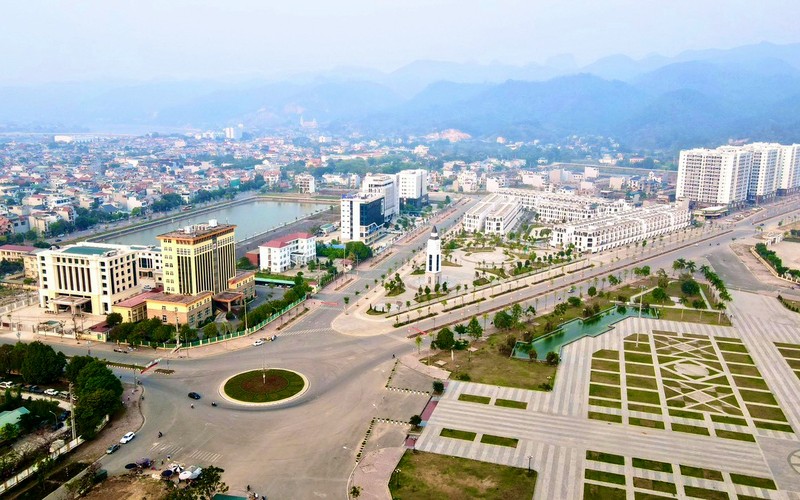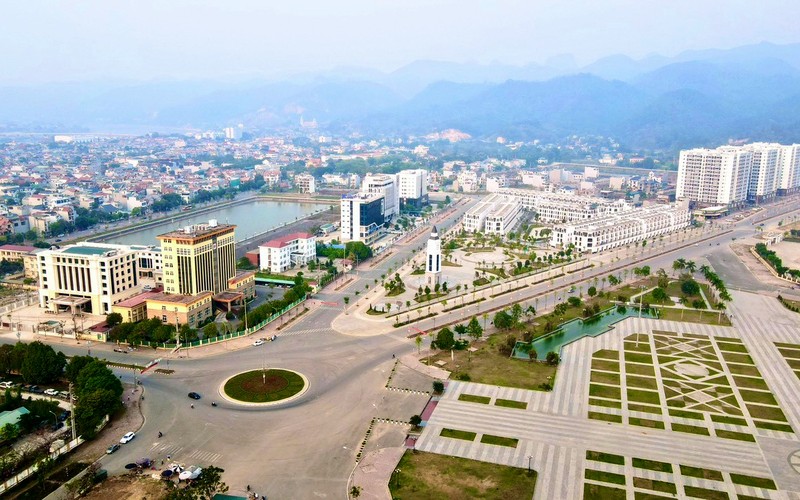
(HBO) - As a mountainous province with many difficulties and challenges, but with solidarity, creativity and innovation, the Party organisations and authorities of Hoa Binh province have strived to maximise its potential and advantages for rapid and sustainable socio-economic development.

A corner of Hoa Binh city, Hoa Binh province.
Bringing into full play potential and advantages
With its high determination and efforts, in 2022, Hoa Binh
met or exceeded 19 out of 20 targets set out in the Resolution of the
provincial Party Committee for the year. Its economic growth was estimated to
hit 9.03%; GRDP per capita was 66.7 million VND (2,840 USD); total state budget
revenue was estimated at 6,410 billion VND; and economic structure shifted in
the right direction. Especially, since 2021, Hoa Binh's agricultural products
such as orange, pomelo, longan and sugarcane have been exported to Japan, the
Republic of Korea, the UK, the US, and the European Union (EU).
Last year, tourism stimulation activities were stepped up,
resulting in a year-on-year increase of 98.5% in the number of tourists to over
3.1 million arrivals. The health insurance coverage surpassed 90% and the
poverty rate decreased by 2.5% to 12.99%. The political and security and social
order and safety situation remained stable, creating favourable conditions for
socio-economic development.
With its specific advantages in terms of climate and
geography, the province has been developing agriculture in the safe, efficient
and sustainable direction, and paying more attention to hi-tech, organic and
smart agriculture to improve the quality of its key products.
With its goal of turning industry into a driving force of
the economy with high, sustainable and effective growth, Hoa Binh has been
allowed by the Prime Minister to establish eight industrial parks with a total
area of more than 1,500 hectares.
Nguyen Phi Long, alternate member of the Party Central
Committee, Secretary of the provincial Party Committee of Hoa Binh, said that
the province is focusing on economic growth in parallel with cultural
development, with focus on preserving and promoting cultural identities of the
Muong ethnic group and "Hoa Binh culture".
The province also boasts much potential and advantages to
develop eco-tourism, resort tourism, and cultural and spiritual tourism. Hoa
Binh is striving to become an attractive destination with typical tourism
products, and a major tourist centre of the northern midland and mountainous
region.
"Breaking barriers" in investment attraction
With its potential and prospects, the locality is highly
determined to remove obstacles in terms of mechanisms and policies to attract
more investors. Chairman of the provincial People's Committee Bui Van Khanh
said that, in addition to general preferential policies, Hoa Binh also has its
own such as exemption from corporate income tax for the first four years and a
reduction of 50% for the next nine years; exemption and reduction of land and
water surface rent; and import and export tax exemption and reduction.
With the desire to development cooperation with businesses,
investors and international organisations, Hoa Binh always opens its door to
welcome domestic and foreign investors, especially in the fields of hi-tech
agriculture, manufacturing, processing, trade, services and tourism. Therefore,
investors will be given all the most favourable conditions to successfully
implement their projects and ensure sustainable development in the coming
years./.
In the spirit of "Party members go first, the people follow”, all households of Party members in the Doan Ket sub-region in Da Bac town, Da Bac district, voluntarily removed gates and fences, and donated land when the road expansion project passed through their properties. Inspired by their example, 68 households in the sub-region quickly followed suit, contributing over 1,400 sq.m of residential and perennial cropland to widen the main road through the residential area. The exemplary role of Party members in Doan Ket stands as a shining example of studying and following President Ho Chi Minh’s thought, morality, and lifestyle.
The Hoa Binh provincial People's Committee held a monthly meeting on May 29 to assess the implementation of socio-economic development tasks in the first six months of 2025, the progress of key projects, and some other important issues.
During his lifetime, President Ho Chi Minh always expressed his deep affection and special concern for children and youth. He once emphasized: "Caring for and educating children well is the responsibility of the entire Party and the entire people”; "First of all, the family (i.e. grandparents, parents, siblings) must do this job well”. "the Party Committees…, the Children’s Committee, the Youth Union, the education sector, and all related organizations must have specific plans to ensure children grow healthier and more progressive”. His teachings has been remaining valuable and serving as the guiding principles in the work of protecting, caring for, and educating children. In line with this ideology, Hoa Binh Province has continuously been prioritizing and investing resources in the well-being of children in recent years.
Mr. Nguyen Phi Long, the alternate Member of the Party Central Committee and Secretary of the Provincial Party Committee chaired the meeting of the Standing Committee of the Provincial Party Committee to provide opinions on several investment projects within the province. There was the attendance of Ms. Bui Thi Minh, the Permanent Deputy Secretary of the Provincial Party Committee and Chairwoman of the Provincial People’s Council; Mr. Bui Đuc Hinh, the Deputy Secretary of the Provincial Party Committee and Chairman of the Provincial People’s Committee and other members of the Standing Committee; the leaders from other departments, agencies, and some localities.
The Standing Board of the Vietnam Fatherland Front (VFF) Committee of Hoa Binh province held a meeting on May 28 to honour outstanding village elders, village heads, and reputable individuals from local ethnic minority and religious communities.
In mid-May, the provincial Museum organised an exhibition named "Duoi la co Dang Cong san Viet Nam quang vinh” (Under the flag of the glorious Communist Party of Vietnam). This meaningful activity took place in the joyful atmosphere to celebrate the country's major holidays and the Party congresses at all levels for the 2025-2030 term, towards the 14th National Party Congress.



